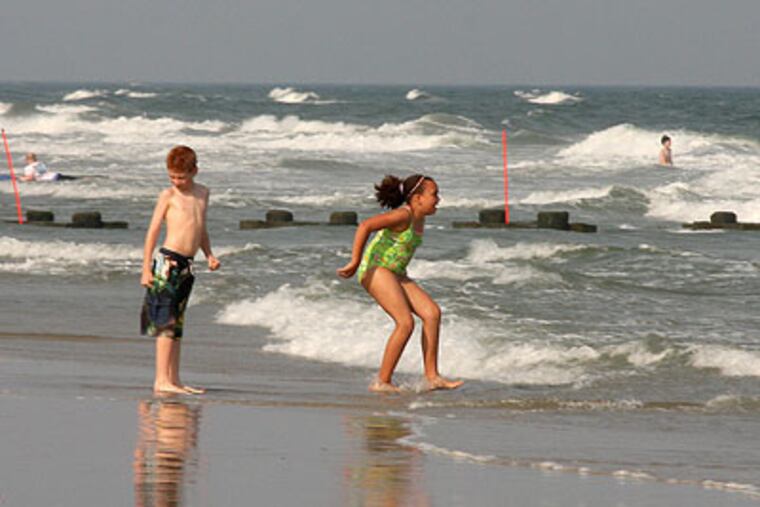New Jersey Shore communities scrape to keep visitor services
WILDWOOD - Municipal officials trying to close a $2 million budget gap here this spring faced the daunting prospect of laying off 20 of the town's 36 active police officers and at least five firefighters on June 1 - just as tourist season kicked off.

WILDWOOD - Municipal officials trying to close a $2 million budget gap here this spring faced the daunting prospect of laying off 20 of the town's 36 active police officers and at least five firefighters on June 1 - just as tourist season kicked off.
The proposal by Mayor Gary DeMarzo shocked residents of this Cape May County resort, where the population soars from about 5,000 year-rounders to a peak of more than 300,000 after Memorial Day. Some have suggested it led to the defeat of DeMarzo, who was indicted on official-misconduct charges last year, in his bid for reelection this month.
On the Jersey Shore, where tourism is the largest industry, even hinting at reducing services could have a catastrophic effect that lasts years, say town managers from Long Beach Island to Cape May.
"We'd be cutting our own throats if we did that," said Ellie Erickson, Brigantine's deputy city manager. "We have a certain level of service in the summer that people have come to expect."
But reducing the number of police and firefighters? The plan by DeMarzo, a former police officer, had everyone from Wildwood's police chief to the guys who spoon water ice on the boardwalk talking about possible repercussions.
"The people who come here for vacation have to feel safe. You have one opportunity to create a lasting impression with tourists about your town, and if it's a bad one, they'll never come back," said Mayor Ernie Troiano Jr., who was sworn in May 17, after his own ouster from the post 18 months ago in a recall vote backed by DeMarzo.
Troiano, a masonry contractor, has vowed that the city will find the money somewhere to maintain police and firefighters and hire the usual dozen or so seasonal officers. He said visitors and residents also would see no reduction in other summer services - such as beach grooming, trash collection, and beautification projects.
"A lot of problems with the budget were dumped on our laps by the previous administration," Troiano noted. "But the people who are coming aren't interested in all that. They just want to have a good time."
Some Jersey Shore administrators say they reduced their towns' debt loads and restructured repayment plans before the recession hit. Others have relied on attrition to reduce their payrolls and pension costs. They have weaned themselves from dependence on state and federal aid, many say, and forced themselves to live within their means.
The theme is making do and stretching a dollar. In tiny Harvey Cedars, on Long Beach Island, a smaller public-works crew has learned the fine art of repairing the borough's aging beach-raking equipment. In Cape May, where the Victorian era still reigns, officials have tightened up on fee collections and installed more parking meters, but they have also added new handicap-accessible ramps to the beach. And in party-hearty Margate, the town's debt service has been restructured to provide money for full-service "relief cabanas" - restrooms - on the beachfront.
In family-friendly Ocean City, where the boardwalk is the centerpiece of the tourist district, officials have splurged and spent more than $1 million on municipal parking lots.
In the hospitality industry, for a town to reveal its financial challenges seems inhospitable.
"People want to come to visit a place like Cape May in large part because it has a beautiful beachfront district that is safe and friendly. They can walk around and enjoy themselves looking at the architecture and walking on the beach without worrying too much about anything around them," City Manager Bruce MacLeod said.
"They don't want to know what the town had to do to provide that experience. They just want to enjoy it," MacLeod said.
As any Jersey Shore regular knows, the perfect vacation is one that's identical to all those before it.
"You have to do whatever it takes to maintain that level of service that people remember from the year before," Harvey Cedars Mayor Jon Oldham said.
Margate City Manager Thomas Hiltner, who is also municipal clerk in neighboring Longport, said officials in the two Absecon Island towns began to prepare for the recession years ago so they should never come to a time when they would need to trim summer services.
"In reality, you have to provide more and more amenities every year. You have to give people a reason to come back to your town," Hiltner said. "You can't cut anything. You have to improve every year."
That's what officials say they have done in Ocean City, Surf City, and Avalon, where beach-replenishment projects are under way or about to start.
"If you don't have a beach, you don't have a beach town," said Scott Wahl, a spokesman for Avalon.
Israel Posner, executive director of the Lloyd D. Levenson Institute of Gaming, Hospitality and Tourism School of Business at Richard Stockton College of New Jersey, warns beach towns about cutting anything that tourists might notice.
"In a sense, just maintaining what you have is going backward," Posner said. "To stay in the game, you have to keep a competitive edge by offering more and more, otherwise your competitors in other beach areas will be right there to snap up your customers next year."